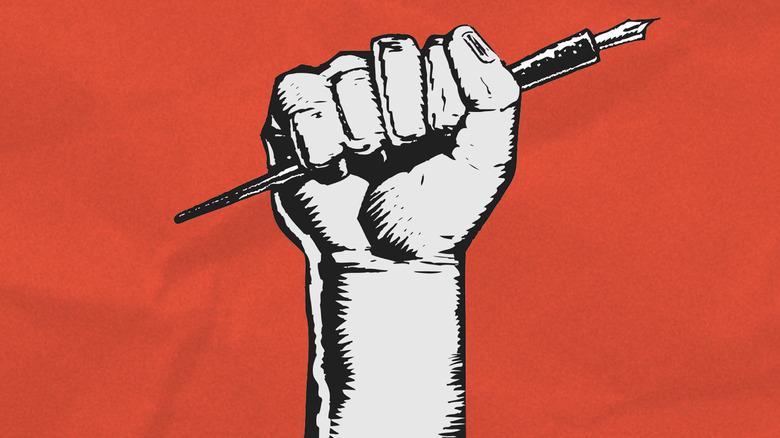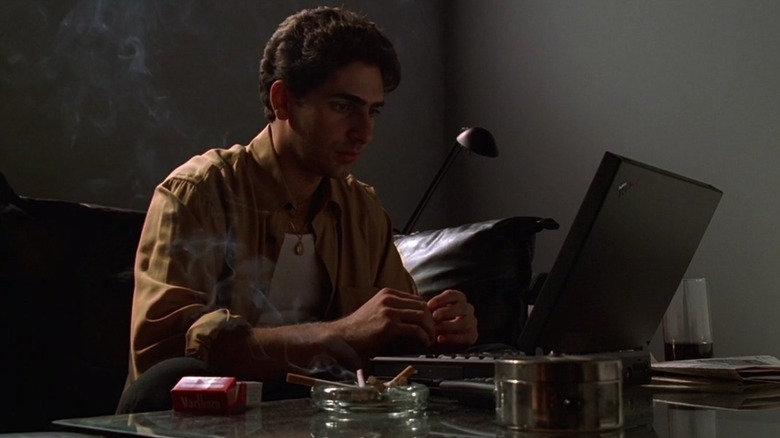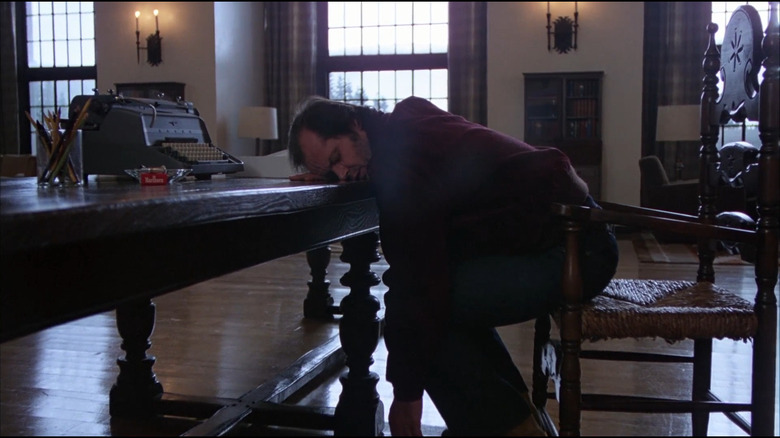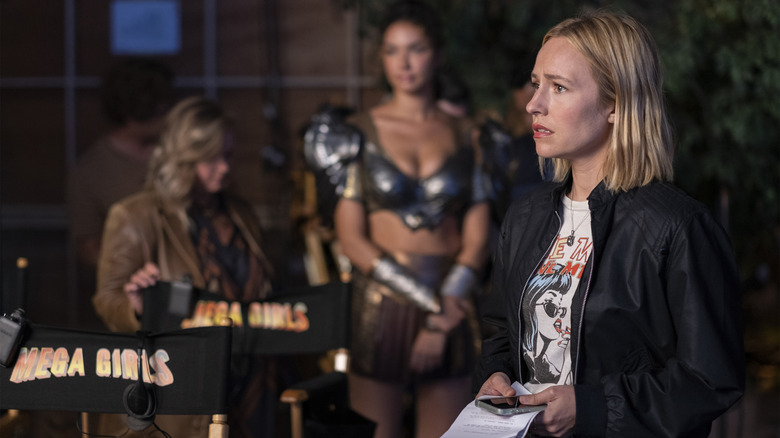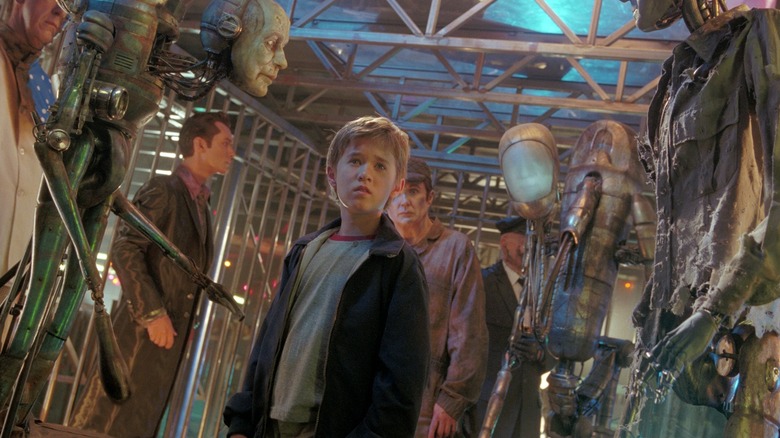Everything Movie Fans Need To Know About The New WGA Deal
Our long, national nightmare is finally over! Or, at least, one of them is. The Screen Actors Guild (SAG-AFTRA) remains on the picket lines as their leadership fights for a fair deal of their own but, as of 12:01 AM PT this morning, the inevitable was made official and the Writers Guild of America (WGA) authorized the end of the union's second-longest labor strike in Hollywood history. But rather than just another simple renewal of a contract with the Alliance of Motion Picture and Television Producers (AMPTP), the trade alliance representing some of the biggest studios and streamers in the business, this hard-fought negotiation meant far more than just business as usual — it's not an exaggeration to say this symbolized an incredibly significant turning point for the future of the entire profession.
Much was at stake these past five months, and the facts readily back up the early consensus among writers that the WGA negotiating team pulled off an unprecedented labor victory along several (if not all) major fronts. Those who've been following along with /Film and especially on social media know just how important it was for the WGA to continue holding the line in the face of numerous obstacles. From sorely needed pay increases to minimum staffing requirements to combat the scourge of "mini-rooms" to the existential threat posed by the rise of artificial intelligence, the union simply couldn't afford to give an inch on any of their biggest demands.
Now that the smoke is clearing and the WGA has provided a summary of all the terms in the final agreement (which must pass one final hurdle to become officially official: a ratification vote by all WGA members in the days ahead), let's break down the highlights of the new contract.
Increased pay minimums
"It's called MBA minimums, T! While studios have been raking in the profits, they've been distributing less and less of that money to the actual writers who are stuck making minimum wage!" Okay, the good news is that I'm dropping this poor man's Christopher Moltisanti shtick immediately. (I'll leave all future "The Sopranos"-posting to the experts.) The better news is that writers won't have to worry about relitigating any of this unpleasantness for another three years, as the terms of the new agreement cover September 25, 2023 through May 1, 2026. The best news is that, for the next three years, writers will get to enjoy a wide array of compensation increases — many of which apply to the younger, less experienced, and therefore most vulnerable members of the guild.
From the beginning, the WGA has remained steadfast in its efforts to right the historical wrong that has seen studios use the newfound streaming era as an excuse to renege on paying script fees and weekly pay while keeping the profits from hit shows for themselves. This has had a trickle-down effect throughout all levels of television production, stifling opportunities for organic progression and promotions for writers trying to make their way up the industry ladder and earn an actual living. (The WGA previously laid out a comprehensive bulletin explaining these core issues here.)
Now, the tentative agreement stipulates a general raise, along with increases in weekly pay, ranging from 5% to 4% to 3.5% in each year of the deal for a total of 12.5%. Compare that to the WGA's original ask of 16% over the same three years, which the AMPTP originally countered with a 9% increase. What this means, frankly, is that writing has now become a more realistic means of making a living.
Pension and health
Pension and health (referred to by the shorthand P&H) isn't exactly the sexiest topic for movie and television fans from the outside looking in, but few terms in the new agreement will make as much of a tangible difference to artists as this one. In a rare moment of good-faith bargaining, the AMPTP actually agreed to the WGA's terms to take 0.5% of the pay increases and divert them to the union's P&H fund as early as May, when negotiations broke down and the strike was first enacted. Thankfully, that's not where the wins for the writers end, however.
As part of the terms of the tentative agreement, the Health Fund contribution rate has increased by 0.5% (compared to the 1% the guild had originally asked for, which was one of a myriad of demands the AMPTP simply never bothered to counter on until now), increasing the total rate from 11.5% to a robust 12%. In perhaps the most wide-ranging benefit of this contract language, one significant gain stipulates that writers who lost health care coverage for one quarter of the year during the strike will now have their coverage extended. Additionally, a new provision corrects another long-running loophole that never made much sense in the first place. As of the ratification of the deal, writing teams will now be treated as — get this — actual individuals. This means their P&H contributions will apply as if they were solo writers, which the WGA defines as "each member of a team gets contributions up to the contribution cap for individual writers; and each member of a team must be paid contributions on the full weekly minimum."
Writers took to Twitter to celebrate this major difference-maker, which you can see in the replies here.
Residuals, residuals, residuals
Now we come to one of the most heated issues and, consequently, one of the WGA's most clear-cut wins. From the outset, writers have wanted to put a stop to what's become the Wild West of the streaming era — a landscape with absolutely zero transparency when it comes to actual viewership numbers (as we here at /Film have covered for quite some time now). This matters because, traditionally, writers for both features and television have relied on box office numbers and subsequent viewership totals on television to dictate the terms of their residuals. Widely considered the most consistent form of income for writers, the advent of streaming has taken a sizable hole out of the writers' pockets. To the WGA's credit, this has remained one core issue that they never once wavered from setting right.
The new terms can be considered nothing less than a coup for writers. For movies made for streaming with a budget over $30 million, screenwriters earned a whopping 18% increase for minimum initial compensation — which comes to $100,000. As for the residual base, they'll now see a 26% increase that will remain dependent on certain key factors. For example, there will now be a brand-new, viewership-based streaming bonus for series and films that are seen by "20% or more of the service's domestic subscribers in the first 90 days of release." Although these terms won't kick in until the new year, this genuinely groundbreaking agreement will lead to a huge increase in foreign streaming residuals (amounting to a 76% raise, meaning Netflix will now fork over $32,830 to writers of a one-hour episode rather than the previous $18,684).
The one caveat, however, is that writers will gain access to streamers' religiously guarded viewership numbers ... but only through a confidentiality agreement.
Artificial intelligence
Arguably more than any other sticking point, the proliferation of AI has resulted in the WGA's unexpectedly dire fight for the very soul of what an artist actually is. If any random AI-bro can train these programs to churn up past examples of art, mash them together, and spit out something "new" (this used to be referred to as "plagiarism"), then what consequences might this have on the actual flesh-and-blood humans who toil away in the hopes of selling a script that they actually poured all their blood, sweat, and tears into creating? And, more to the point, this seems like a shortcut to getting even more awful, algorithm-based, low-calorie movies that we don't need any more of than we already have.
Happily, the WGA took this concern as seriously as the rest of us did. There are now firmly-established regulations regarding the use of AI, which first and foremost upholds the provision that, by definition, AI-generated material simply can't be considered as source material in any way, shape, or form. According to the WGA, this means that "AI-generated material can't be used to undermine a writer's credit or separated rights." While individual writers can still choose to use AI when writing their own scripts, this requires the consent of the company they work for and additional protection against the aforementioned company (meaning a studio or streamer) forcing them to do so. Similarly, they're also required to inform writers of any material that has been generated by AI, as well.
Bottom line? Human-made scripts can't be exploited for the purpose of training AI. Hopefully, these requirements now make it easier for SAG-AFTRA to avoid a similarly existential fate.
